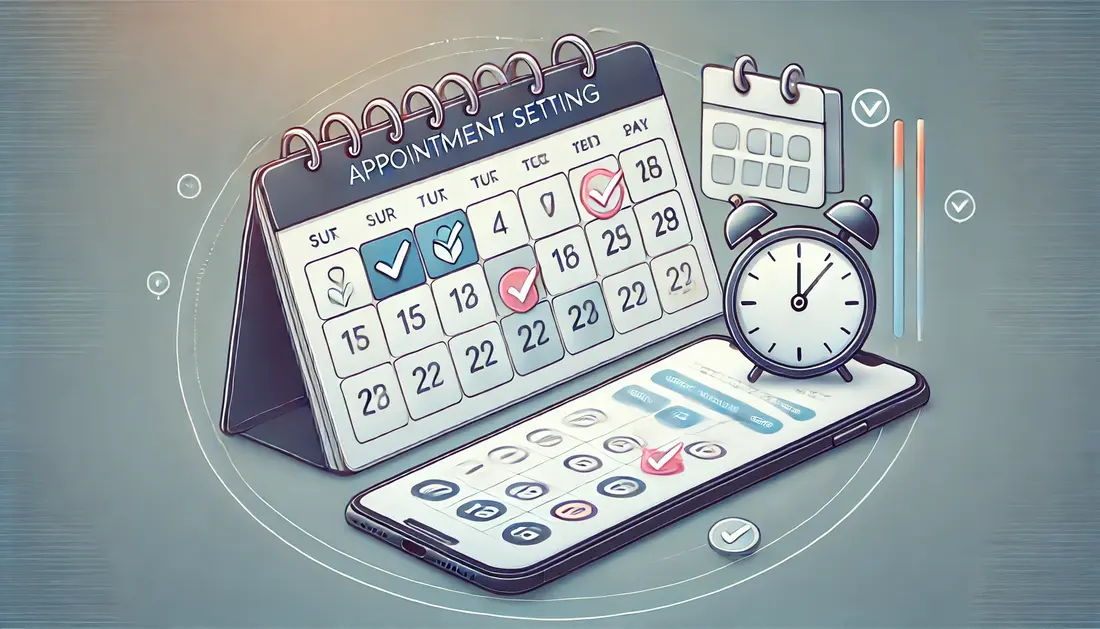Appointment setting is more than just a job; it’s a critical function that can make or break a company’s sales efforts. Imagine being the person who opens the door to potential new business, guiding prospects from curiosity to commitment.
As an appointment setter, you play a pivotal role in this process, acting as the first point of contact and ensuring that the sales pipeline remains full. Your work directly impacts the company’s bottom line, and mastering this role requires a unique set of skills, strategies, and a deep understanding of the sales process.
This guide will take you through every aspect of becoming a successful appointment setter, offering insights, tips, and practical advice that will help you excel in this rewarding career.
What are the Responsibilities of an Appointment Setter?
The role of an appointment setter is multifaceted, requiring both a strategic mindset and excellent communication skills. Your primary responsibility is to reach out to potential clients, whether through cold calling, following up on leads, or contacting referrals. The goal is to schedule a meeting between the prospect and a sales representative who can further explore their needs and offer solutions.
But your job doesn’t end there; you’re also responsible for keeping meticulous records of all interactions, tracking the progress of each lead through the sales funnel, and ensuring that no opportunity is missed.
In many cases, appointment setters work closely with sales teams, providing them with valuable insights into the needs and concerns of potential clients.
This information is crucial for sales representatives, as it allows them to tailor their approach and increase the likelihood of closing a deal. Whether you work in an office or remotely, understanding these responsibilities and executing them efficiently is key to success in this role.
The Skills and Qualifications You Need to Succeed
To excel as an appointment setter, you need a blend of hard and soft skills. On the technical side, strong communication skills are essential. You must be able to articulate your message clearly and persuasively, whether you’re speaking over the phone or writing an email. Active listening is equally important—understanding the client’s needs and concerns will allow you to tailor your pitch and increase your chances of success.
Time management and organizational skills are also critical. As an appointment setter, you’ll be handling multiple leads at once, and it’s important to manage your time effectively to ensure that each prospect receives the attention they deserve.
Being organized will help you keep track of your interactions, follow up on leads on time, and maintain a consistent flow of appointments. While a high school diploma is often sufficient, having some background in sales or customer service can give you an advantage.
Experience with Customer Relationship Management (CRM) software is also beneficial, as these tools are commonly used to manage and track leads. Soft skills like persistence, resilience, and the ability to handle rejection with grace are equally important. In sales, rejection is inevitable, but how you respond to it can make all the difference in your success.
How to Become an Appointment Setter?
Becoming an appointment setter doesn’t require a specific educational background, but there are several pathways you can take to prepare for the role. Many appointment setters start with a high school diploma, but others choose to pursue further education in fields like communications, business, or marketing.
These subjects provide a strong foundation in the skills needed for the role, such as communication, persuasion, and understanding business dynamics.
Training is another important aspect of becoming an appointment setter. Some companies offer on-the-job training, where you can learn the ropes under the guidance of experienced professionals.
Alternatively, you can seek out online courses or workshops that focus on appointment setting, sales techniques, and effective communication. These programs can provide valuable insights and help you develop the skills needed to excel in the role.
Experience is also a key factor. If you’re new to the field, consider starting in an entry-level sales or customer service position.
These roles can provide you with the opportunity to develop your communication skills, learn how to handle customer objections and gain a better understanding of the sales process. As you gain experience, you can move into appointment-setting positions with more responsibility and higher earning potential.
Appointment Setting Techniques
Appointment setting is both an art and a science. It requires careful preparation, effective communication, and strategic thinking. One of the most important steps in the appointment-setting process is preparation. Before you make any calls, it’s essential to do your homework. Research the company and the individual you’re contacting. Understand their needs, challenges, and pain points.
The more you know about your prospect, the better equipped you’ll be to tailor your message and make a compelling case for why they should meet with your sales team.
Crafting an effective script is another critical component of a successful appointment setting. While having a structured script can help guide the conversation, it’s important to remain flexible and adapt based on the client’s responses.
Your script should include key talking points, but it should also allow for natural conversation and the ability to address any objections the client may have. Remember, the goal is to engage the client in a meaningful dialogue, not just to recite a script.
Effective communication is the cornerstone of successful appointment setting. This goes beyond just what you say—it’s also about how you say it. Your tone, pacing, and clarity all play a role in how your message is received. Speaking with confidence, maintaining a positive attitude, and being respectful of the client’s time can all help to build rapport and increase the likelihood of securing an appointment.
Finally, follow-up is crucial in an appointment setting. Often, it’s the follow-up that secures the appointment. After your initial contact, be sure to follow up with a polite reminder or additional information that could be helpful to the client.
The timing of your follow-up is important as well—too soon and you may come off as pushy, too late and the prospect may have forgotten about you. Finding the right balance is key to effective follow-up.
Leveraging Tools and Technology for Appointment Setting
In today’s fast-paced business environment, technology plays a crucial role in appointment setting. Customer Relationship Management (CRM) systems are among the most important tools at your disposal.
These platforms, such as Salesforce or HubSpot, allow you to manage leads, track interactions, and keep detailed records of your calls and emails. By using a CRM, you can ensure that no lead falls through the cracks and that you’re following up with prospects promptly.
Dialers and automation tools are also invaluable for appointment setters. These tools can help you manage high volumes of calls, leave voicemails, and even send follow-up emails automatically.
This allows you to focus more on the conversation itself, rather than the logistics of dialing numbers or sending emails. Additionally, many CRM systems integrate with these tools, streamlining the entire process and making your job much more efficient.
Communication platforms, whether traditional phone systems or modern VoIP services are the backbone of appointment setting. These tools enable you to connect with clients quickly and efficiently, ensuring that you can reach them wherever they are. Some platforms also offer features like call recording, which can be useful for reviewing your calls and identifying areas for improvement.
Overcoming Challenges in Appointment Setting
Appointment setting, like any sales role, comes with its own set of challenges. One of the most common obstacles is dealing with rejection. It’s not unusual to face multiple rejections in a day, and this can be discouraging.
However, it’s important to remember that rejection is a normal part of the sales process. The key is to not take it personally and to view each rejection as an opportunity to learn and improve. By analyzing why a prospect said no, you can refine your approach and increase your chances of success in future calls.
Another challenge in appointment setting is reaching decision-makers. In many companies, gatekeepers such as assistants or receptionists screen calls, making it difficult to get through to the person you need to speak with. Developing strategies to bypass these gatekeepers can be a game-changer.
For example, calling at off-peak times when gatekeepers are less likely to be around, or building rapport with the gatekeeper can increase your chances of reaching the decision-maker.
Managing a large volume of calls and leads can also be overwhelming, especially if you’re working on multiple campaigns or for different clients. This is where organization and time management skills come into play.
Using CRM systems and automation tools can help you stay on top of your tasks, ensuring that you’re following up with leads promptly and that no opportunities are missed.
Career Outlook and Advancement Opportunities
The career outlook for appointment setters is generally positive, with demand particularly strong in industries like real estate, healthcare, technology, and financial services. As businesses continue to prioritize lead generation and customer engagement, the need for skilled appointment setters is likely to grow. For those looking to advance their careers, there are several paths you can take.
With experience, you might move into a senior appointment setter role, where you manage a team of setters and help develop strategies for improving the efficiency and effectiveness of the appointment-setting process. Alternatively, you could transition into a sales or business development position, where you take on more responsibility for closing deals and driving revenue for the company.
Specializing in a particular industry or type of appointment setting, such as B2B (business-to-business) or B2C (business-to-consumer), can also open up new opportunities. As you gain experience and develop a reputation as a skilled appointment setter, you may also have the opportunity to work as a consultant, helping other businesses to improve their appointment-setting processes.
In terms of salary, appointment setters can expect to earn anywhere from $30,000 to $50,000 annually, depending on experience, location, and the industry in which they work. With experience and proven success, this figure can increase, especially if you move into more senior or specialized roles. Additionally, many appointment setters receive performance-based bonuses, which can significantly boost their earnings.
Real-Life Examples
One of the best ways to improve your appointment-setting skills is to learn from the experiences of others. Real-life case studies and success stories can offer valuable insights into what works—and what doesn’t—in the world of appointment setting.
For example, consider the story of a real estate appointment setter who, by refining their script and improving their follow-up strategy, was able to increase their appointment success rate by 30%. By studying what this individual did right, you can identify strategies that you can apply to your work.
Similarly, learning from the mistakes of others can be just as valuable. For instance, an appointment setter who struggled with high rejection rates might discover that their script was too rigid, or that they weren’t doing enough research before making calls.
By recognizing these pitfalls, you can avoid making the same mistakes and increase your chances of success.
Case studies can also provide inspiration and motivation. Seeing how others have overcome challenges and achieved success in an appointment setting can encourage you to keep pushing forward, even when the going gets tough.
Whether it’s mastering the art of persuasion, optimizing your use of technology, or simply developing a thicker skin, there are countless lessons to be learned from those who have succeeded in this challenging but rewarding field.
Your Journey to Becoming a Top Appointment Setter
Becoming a successful appointment setter requires a unique blend of skills, persistence, and the ability to adapt to different situations. It’s a role that can be incredibly rewarding, both personally and professionally, as you play a critical role in helping your company achieve its sales goals.
By understanding the responsibilities of the role, honing your communication techniques, and leveraging the right tools and technology, you can excel as an appointment setter and open the door to a variety of career advancement opportunities.
Whether you’re just starting in your career or looking to improve your existing skills, the strategies, and insights outlined in this guide will help you on your journey to becoming a top-notch appointment setter.
Remember, the key to success in this role is continuous learning and improvement. By staying up-to-date with the latest trends and best practices, and by learning from the experiences of others, you can position yourself for long-term success in the world of appointment setting.
FAQs
What does an appointment setter do?
An appointment setter is responsible for reaching out to potential clients, typically through phone calls or emails, with the goal of scheduling a meeting between the prospect and a sales representative. This role is crucial in the sales process, as it ensures that only qualified leads are passed on to the sales team, thereby increasing the chances of closing a deal.
How much can you earn as an appointment setter?
The salary for appointment setters varies depending on experience, location, and industry, but typically ranges from $30,000 to $50,000 per year. In addition to base salary, many appointment setters also receive performance-based bonuses, which can significantly increase their overall earnings.
Is previous sales experience necessary to become an appointment setter?
While not always necessary, previous experience in sales or customer service can be beneficial for aspiring appointment setters. This experience helps to develop key skills such as communication, persuasion, and the ability to handle objections—all of which are crucial for success in an appointment setting.
What industries hire appointment setters?
Appointment setters are in demand across a variety of industries, including real estate, healthcare, technology, financial services, and more. These industries rely on appointment setters to generate leads and schedule meetings between potential clients and sales representatives.
How can I improve my appointment-setting skills?
Improving your appointment-setting skills requires a combination of practice, continuous learning, and the right tools. Effective communication, active listening, and the ability to handle objections are all critical skills to develop. Additionally, using CRM systems and other automation tools can help you stay organized and manage your leads more efficiently. Learning from real-life case studies and success stories can also provide valuable insights and inspiration.


![The Comprehensive Guide to Appointment Setting [2024]](https://biglysales.com/wp-content/uploads/2024/07/Leaderboard-1-1-1.webp)
![Streamline Your Workflow with Bigly Sales Integrations [2025]](https://biglysales.com/wp-content/uploads/2024/12/Streamline-Your-Workflow-with-Bigly-Sales-Integrations-2025-768x439.webp)




